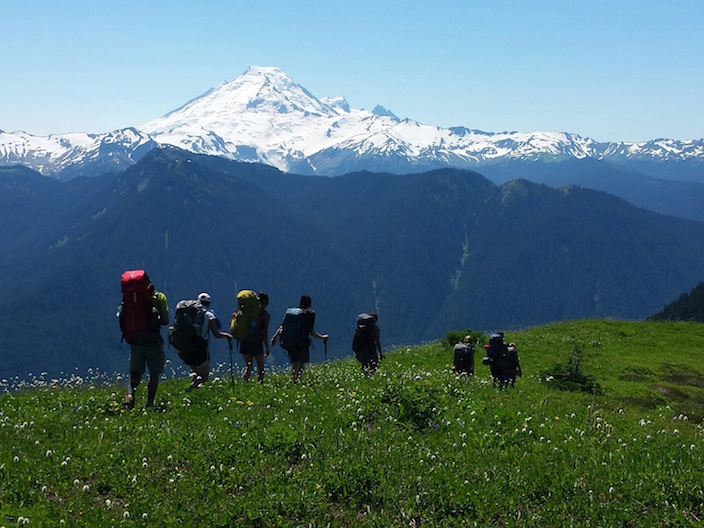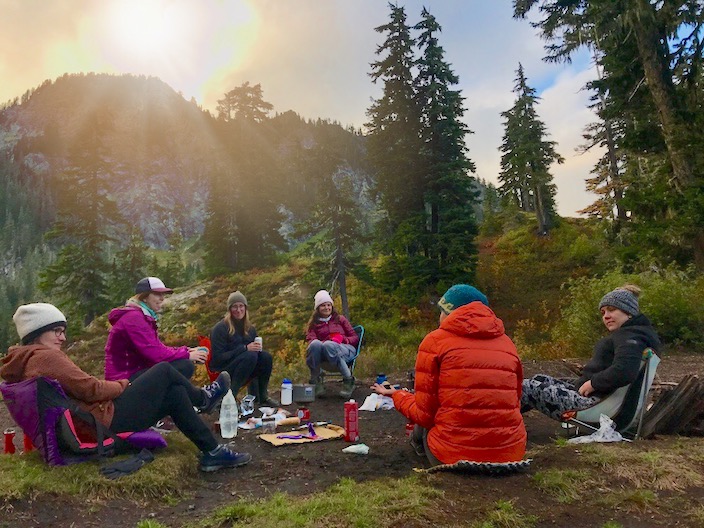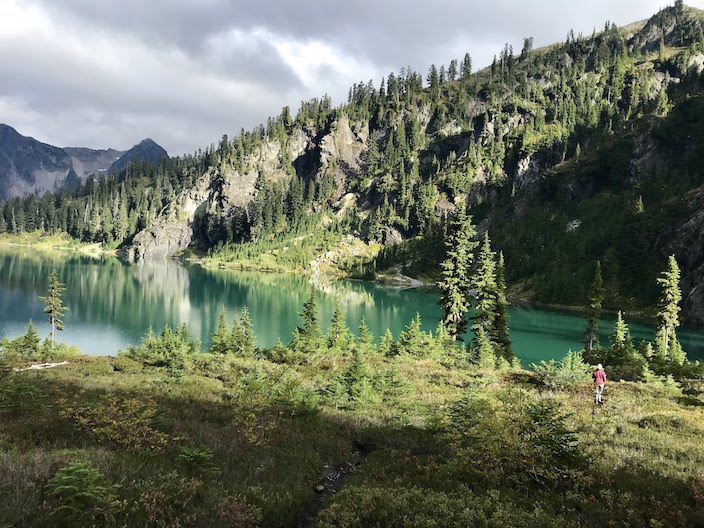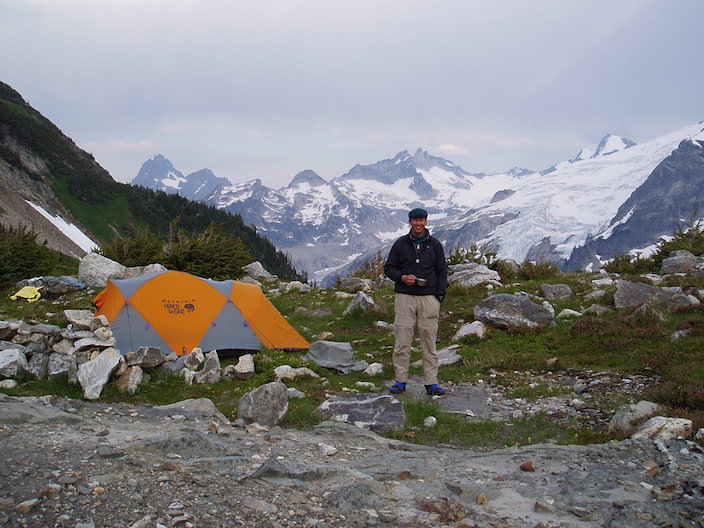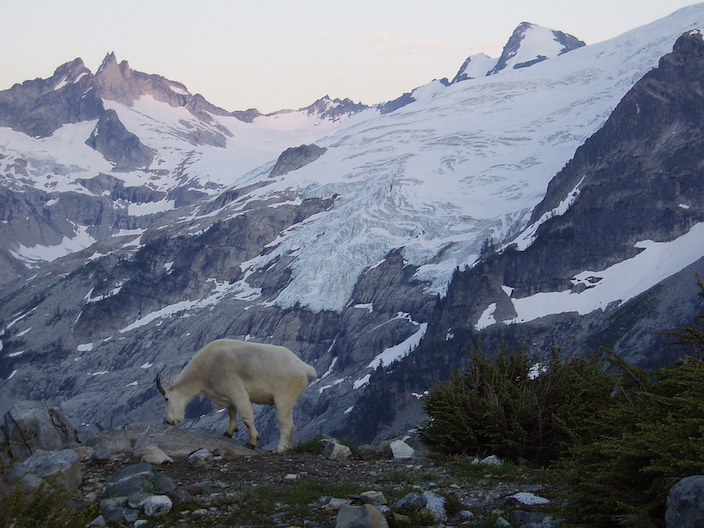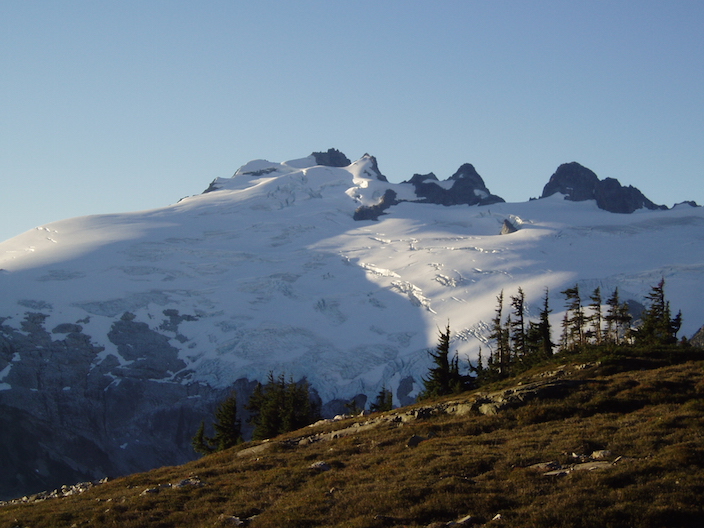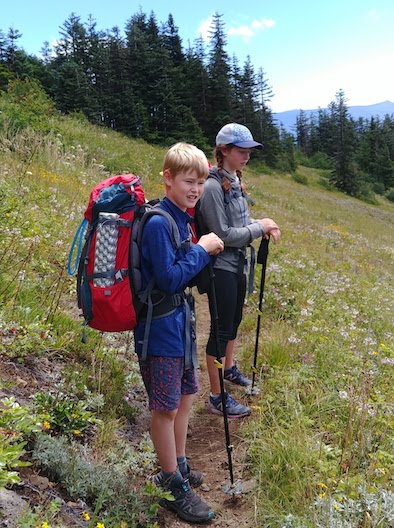Backpacking and Wilderness Skills Overview This weekend course is designed for hikers and other outdoor enthusiasts who have little or no overnight camping experience in a mountain or wilderness environment. By the end of the weekend, students will have acquired the skills to plan and carry out an enjoyable multi-day backpacking trip using established trails and campsites, and will have a foundation upon which to build more advanced wilderness and mountaineering skills.
For those people who are motivated to jump onto our core mountaineering courses, such as our three-day Mt. Baker climb , our Mt. Whitney climbs , and Intro to Mountaineering , the skills covered in this course are required. Many people assume that physical fitness is the main hurdle to learning mountaineering; in fact, fitness, though important, is secondary to basic backpacking know-how.
Skills covered in this course will include:
Equipment selection and packing The first morning of the course is dedicated to equipment selection; rentals and purchases are available at AAI's Equipment Shop .
Fundamentals of land navigation, map, and compass Meal planning and open air cooking We provide detailed food shopping lists in advance (including vegetarian, vegan, and gluten-free options) and discuss principles of nutrition for backpacking and wilderness trips.
Water treatment and approaches to hydration We discuss the pros and cons of iodine, chlorine compounds, filters, and boiling. We also address how to balance adequate hydration with optimum pack weight.
Selection and safe operation of backpacking stoves We teach the use of both liquid-fuel and canister-fuel stoves, discuss their pros and cons, and assist students in preparing their own meals.
Knots and hitches for securing tents and food bags Food storage and caching strategies Leave No Trace principles On all AAI courses, we present the seven principles of Leave No Trace to help participants protect the fragile alpine environment for future lovers of the mountains.
Construction of a comfortable, low-impact campsite How to go to the bathroom in the outdoors And many, many other backcountry skills
VIDEO
This course runs as a public, group outing every other weekend in the summer months. It can also be taught as a private program for you, your family, or a group of friends, with custom dates and length appropriate to your needs. Call us with any questions at (360) 671-1505 .
Backpacking and Wilderness Skills Curriculum Overnight backpacking experience is a prerequisite for many of our courses, including all of the public, multi-day introductory alpine courses taught in the Cascades. What makes overnight backpacking different from long day hikes or overnight camping in a campground?
In one sense the answer is obvious: when backpacking, you hike with a heavy pack and camp with only the food and shelter you’ve carried with you.
In another sense, however, this statement misses everything that matters. Carrying loads and camping both entail a host of seemingly trivial skills and habits which, taken all together, can present a major challenge to a beginner. The average newcomer to backpacking needs to absorb many small bits of knowledge and competence without the added pressure of acquiring mountaineering skills and other subject matter that we present in our core course offerings.
Subjects we cover:
Packing a backpack. A modern internal-frame pack may look very high-tech, but all the zippers and straps can create the illusion that the designers have already solved the problem of carrying loads comfortably. They have not. In order to make any load comfortable, you must pack carefully, bearing in mind how you will be moving on your chosen route. A long hike up and down gentle switchbacks demands a different weight distribution from an off-trail climb across unstable talus.
Eating and drinking. Even marathon runners and triathletes often misunderstand the nutritional and hydration demands of all-day backpacking. The slower pace, often combined with other forms of exertion like scrambling or bushwhacking, makes regular food and water breaks very desirable. Initially, this will feel excessive to many people, whether because they are used to a normal three-meal-a-day schedule, or because they are accustomed to fasting during high-output exercise. Either way, one's eating and drinking habits must be subjected to a new discipline.
Just walking can be a big deal. It can be surprisingly hard to maintain an efficient walking pace that is sustainable in the mountains. Many people are inclined to hike faster – and with longer paces – than they should, whether out of eagerness or because they want to feel like they're "working out". It's necessary to learn what an all-day backpacking pace feels like, and a course can save many days of trial-and-error.
How to wear your boots. There was a time when boots were custom made for each hiker, but (mostly) those days are long past. Fit is never quite what you’d like it to be; and worse, feet can change over the course of a long day (or at altitude) as tissues swell and arches spread out. Socks of various materials and thicknesses, insoles, and custom lacing patterns can all make the difference between a pleasurable hike and a blister-ridden slog.
Clothing – What to bring. Experienced, fit outdoor athletes who have not had the experience of carrying all their clothing over a period of days will often miss many of the nuances of efficient clothing selection for backpacking. On-piste skiers, cyclists, and even strong day-hikers, when they turn to backpacking, routinely err in favor of heavy, durable, excessively weatherproofed clothing. A multi-day trip forces the selection of lightweight clothing items that can be intelligently layered to provide the exact combination of insulation, wind protection, rain protection, and sun protection needed in any given set of conditions, with the minimum of weight.
Clothing – How to dress. In addition to clothing selection for a trip, choice of dress for each day also presents a challenge. People often over-prepare for showers that never turn into steady rain; bulk up on insulation when wind protection would be preferable; or delay too long before changing from wet to dry clothes once they arrive in camp.
These are just a few examples of habits and routines we take for granted in civilization, but which differ substantially when we journey into the mountains for an extended period.
Many people assume that they can easily acquire these skills while on their mountaineering courses, either because they usually pick up new skills quickly or because they are strong athletes. But acquisition of these skills takes patience, openness to experience, and pro-active adaptation – like adopting, temporarily, a new way of life. Staying dry; staying warm; staying hydrated; walking without discomfort; knowing your whereabouts: these are things we take for granted in everyday life, but they are achievements in the backcountry.
We can’t pretend that our overnight backpacking course will be able to cover every one of these topics with equal thoroughness or turn you into a seasoned backpacker. But the intention is to broach each skill area just enough to get you primed and thinking about it – to ease the job of mastering these backpacking “life skills” that can make the difference between merely surviving and having a “peak” experience.
Backpacking and Wilderness Skills Course Details Max Ratio - 5:1 or 10:2 (Students:Guides)
Capacity - 10
Prerequisites
Day hiking experience in the mountains
Good general physical fitness
Inclusions
Tuition for the program includes the guides' fee and all group equipment, transportation, and a Zoom gear consult with an Equipment Specialist.
Exclusions
Personal equipment is not included in the program cost, but it can be rented from our equipment shop.
You are responsible for providing your own food for this course.
Navigation Programs Though this program does cover backcountry navigation, there is limited time. Some participants choose to enhance their wilderness navigation skills before or after a program by combining this class with either the three-hour Backcountry Navigation Essentials class, or the one-day Backcountry Navigation Comprehensive program.
